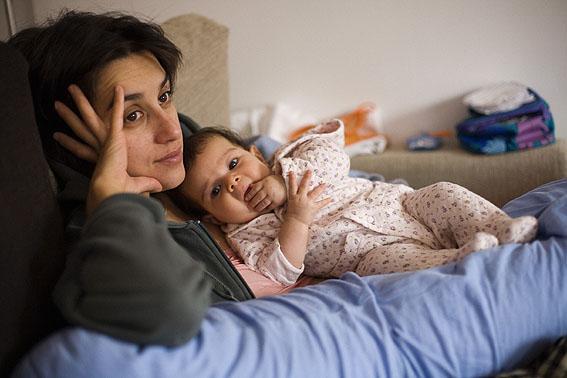The new method accurately predicts 80% of postpartum depression
Worldwide, up to 13% of women suffer from postpartum depression, which has a marked effect on the quality of life as well as the ability of the mother to take care of her newly born child. Now, Spanish researchers have developed a diagnostic model with an accuracy of up to 80% - the most reliable forecast to date for this disease.
Salvador Tortajada, lead researcher, staff of Valencia Polytechnic University (UPV) said: 'Early symptoms of postpartum depression will help prevent this disease from developing in women at risk.'
Experts surveyed 1,397 Spanish women who gave birth between December 2003 and October 2004 in seven Spanish hospitals, from which different models predicted mothers. who will face the risk of depression during the first week of life with an accuracy of up to 80%.

About 10 to 15% of women suffer from postpartum depression.(Photo: SINC)
This is the first survey in this field in Spain, the results are published recently in Methods of Information in Medicine. This survey is believed to be the most successful ever in the diagnosis of postpartum depression.'Now we need clinical evaluations with psychiatrists beginning to test directly on patients to examine the true potential of this predictive tool,' Tortajada said.
The team used artificial nervous systems and filtered out a range of risk factors in previous studies and research: levels of help from people around the mother, money problems. Using family history, emotional changes in the process of birth, emotional balance and polymorphism in the serotonin transporter gene (the higher the expression level of this gene, the greater the risk of depression) ).
They also found that two protective factors can help reduce the risk of depression - age (older women are less likely to get the disease), and work during pregnancy (still working in Pregnancy helps reduce the risk of depression.
However, many studies have shown that between 10 and 15% of women who give birth suffer from depression, this phenomenon occurs around the time the baby is between two and three months of age. This is a disease that affects the cognitive and emotional activity of the patient (even in bad cases, it even leads to suicidal action) and can cause serious harm to the development of future child.
- 10 methods to help young mothers get rid of postpartum depression
- Postpartum depression - Signs, causes and prevention
- Two genes predict the postpartum depression
- Eating a lot of fish helps reduce postpartum depression
- Depression - how scary is it?
- Unbelievable benefits from postpartum skin contact
- Depression before birth is easy to cause depression for the next generation
- Buried people to cure depression
- The more dirty the husband is, the more easily the wife becomes depressed after birth
- New test methods help treat cancer accurately
- 7 facts about depression
- Discovering genes related to depression
 Green tea cleans teeth better than mouthwash?
Green tea cleans teeth better than mouthwash? Death kiss: This is why you should not let anyone kiss your baby's lips
Death kiss: This is why you should not let anyone kiss your baby's lips What is salmonellosis?
What is salmonellosis? Caution should be exercised when using aloe vera through eating and drinking
Caution should be exercised when using aloe vera through eating and drinking